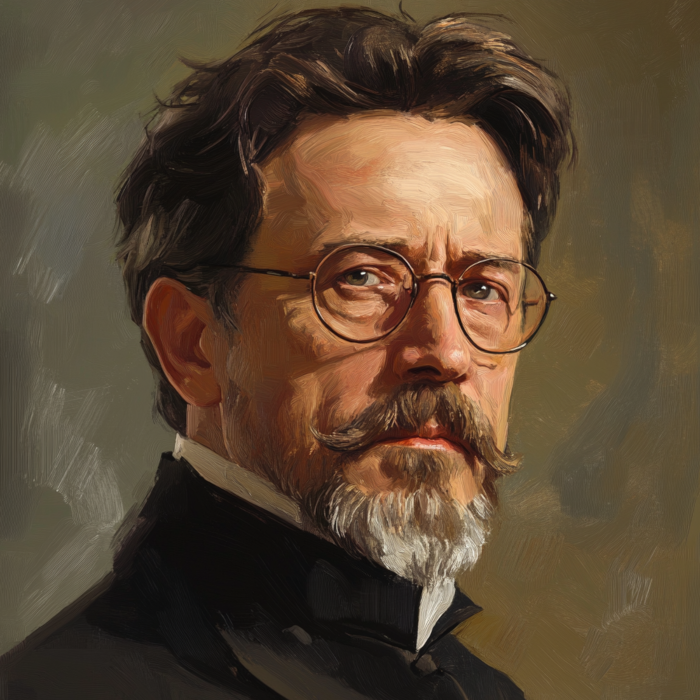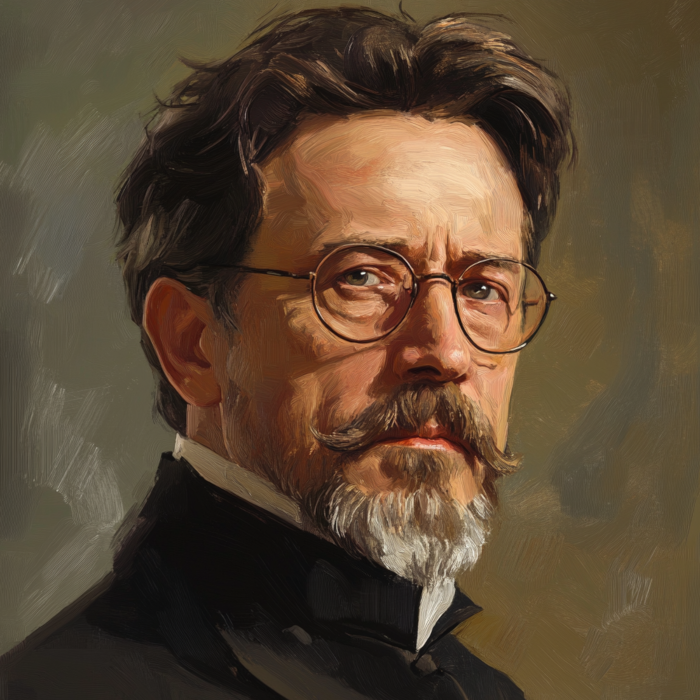
Anton Chekhov (1860-1904) was a Russian playwright, short-story writer, and physician who is regarded as one of the greatest masters of modern literature. He revolutionized the art of short story writing and became a major influence in dramatic literature through his emotionally complex plays. His work is known for its deep insight into human nature, a subtle and often tragicomic depiction of everyday life, and a delicate balance between tragedy and humor. Here is an overview of his life and work:
Early Life and Background
- Birth and Family: Anton Pavlovich Chekhov was born on January 29, 1860, in Taganrog, a port city in southern Russia. His father, Pavel Chekhov, was a grocer, and his family struggled financially. Chekhov grew up in modest circumstances, often helping out in the family shop.
- Education and Early Hardships: In 1876, Chekhov's father declared bankruptcy, forcing the family to move to Moscow to escape creditors. Anton remained in Taganrog to finish his education, supporting himself by tutoring. He later moved to Moscow to join his family and enrolled in Moscow University to study medicine. Despite his demanding medical studies, Chekhov began writing short stories to earn money, publishing under pseudonyms.
Medical Career and Writing Beginnings
- Physician and Writer: Chekhov graduated as a physician in 1884 and worked as a doctor throughout his life, often providing care for the poor. He famously said, "Medicine is my lawful wife, and literature is my mistress." His medical background greatly influenced his writing, giving him insight into the human condition and the suffering of those around him.
- Early Stories and Humor: Chekhov initially wrote humorous sketches and short stories for magazines, gaining popularity for his wit and ability to capture the intricacies of everyday life. His first collection of stories, At Dusk (1887), earned him the Pushkin Prize and established him as a prominent literary figure.
Evolution as a Writer
- Shift to Serious Themes: As Chekhov matured as a writer, his works moved beyond humor to explore deeper, more serious themes such as the passage of time, the meaning of life, and the struggles of ordinary people. His stories became more nuanced, employing indirect storytelling techniques and a deep sense of ambiguity, which later became hallmarks of his style.
- Innovative Short Stories: Chekhov is celebrated for transforming the short story genre, moving away from conventional plots and dramatic twists toward a focus on the characters’ inner lives and their emotions. His stories often have open endings, leaving readers with unresolved questions, and feature everyday people dealing with loneliness, unfulfilled dreams, and fleeting moments of beauty.
Major Short Stories
Chekhov’s short stories are notable for their ability to convey complex human experiences in a compact form. Some of his most famous stories include:
- "The Lady with the Dog" (1899): This story is one of Chekhov's most famous and is often considered a masterpiece of short fiction. It tells the story of an extramarital affair between a banker, Dmitri Gurov, and a young woman, Anna Sergeyevna, whom he meets in Yalta. The story is notable for its subtle depiction of love, intimacy, and the complexities of human relationships.
- "The Bet" (1889): This story revolves around a lawyer and a banker who make a bet on whether solitary confinement is preferable to the death penalty. The narrative delves into philosophical themes, exploring human nature, the value of freedom, and the purpose of life.
- "Ward No. 6" (1892): Set in a provincial hospital's psychiatric ward, the story presents a critical view of Russian society's treatment of mental illness and human suffering. It explores themes of alienation, power, and the indifference of those in authority.
Chekhov as a Playwright
In addition to his success as a short-story writer, Chekhov made significant contributions to the development of modern drama. His plays are considered foundational to modern theatre and have had a profound influence on the dramatic arts.
The Seagull (1896)
- Plot and Themes: The Seagull is one of Chekhov's most famous plays and represents a shift in the portrayal of characters and action in the theatre. It follows the lives of several characters in a country estate, including the aspiring writer Konstantin Treplev and the famous actress Irina Arkadina. The play explores themes of unrequited love, artistic failure, and the search for meaning.
- Innovative Dramatic Style: The play was initially poorly received, but it later became a success under the direction of Konstantin Stanislavski at the Moscow Art Theatre. The Seagull is notable for its innovative use of subtext, where much of the emotional action takes place beneath the surface of the dialogue.
Uncle Vanya (1899)
- Plot and Themes: Uncle Vanya revolves around a provincial estate where Uncle Vanya and his niece Sonya manage the property for the benefit of Sonya’s father, Professor Serebryakov. The arrival of the professor and his beautiful young wife, Yelena, leads to tensions and unfulfilled desires. The play explores themes of wasted potential, love, and the challenges of living a meaningful life.
- Realism and Emotional Complexity: The play is a masterful exploration of unfulfilled lives and the burdens of everyday existence. Its characters are ordinary people dealing with their dreams, disappointments, and complex emotions, reflecting Chekhov's commitment to realism.
Three Sisters (1901)
- Plot and Themes: Three Sisters tells the story of the Prozorov sisters—Olga, Masha, and Irina—who dream of returning to Moscow, where they believe they will find happiness and fulfillment. The play is a poignant exploration of longing, change, and the inevitability of lost dreams.
- Themes of Change and Futility: The play portrays the inevitability of change and the characters’ inability to achieve their desires. Chekhov captures the small, often unnoticed moments of life that reveal profound truths about human nature.
The Cherry Orchard (1904)
- Plot and Themes: The Cherry Orchard, Chekhov's last play, centers around an aristocratic family who must sell their estate, including a beloved cherry orchard, to pay off their debts. The play is often seen as a metaphor for the changing social order in Russia, with the decline of the aristocracy and the rise of a new, more pragmatic class.
- Comedy and Tragedy: Chekhov described the play as a comedy, although it is often interpreted as a tragic commentary on the passage of time, the inevitability of change, and the failure to adapt. The juxtaposition of comedy and tragedy is central to Chekhov's dramatic style.
Themes and Style
- Subtlety and Subtext: Chekhov’s work is known for its subtlety, with much of the emotional action occurring beneath the surface of the dialogue. His use of subtext—the meaning behind the spoken words—had a revolutionary impact on drama and influenced the development of naturalistic acting techniques by Konstantin Stanislavski.
- Focus on Ordinary Life: Chekhov rejected melodrama and focused on the mundane, often tragicomic experiences of ordinary people. His stories and plays emphasize the inner lives of characters and the small, often unnoticed moments that shape their existence.
- Ambiguity and Open Endings: Many of Chekhov's stories and plays conclude without definitive resolutions, reflecting the complexities and uncertainties of real life. He believed that literature should raise questions rather than provide answers, and his endings often leave readers to contemplate the fate of his characters.
Later Life and Death
- Health Issues: Chekhov struggled with tuberculosis for much of his adult life. Despite his illness, he continued to write and practice medicine, often traveling to rural areas to treat those in need. He even traveled to Sakhalin Island in 1890 to document the conditions of prisoners, demonstrating his compassion and concern for social justice.
- Marriage: In 1901, Chekhov married Olga Knipper, an actress with the Moscow Art Theatre who appeared in many of his plays. Their marriage was marked by long separations due to Chekhov’s health, but they remained devoted to each other.
- Death: Chekhov's health deteriorated in the early 1900s, and he moved to the spa town of Badenweiler in Germany to seek treatment. He died on July 15, 1904, at the age of 44. His death was a profound loss to the literary and dramatic world.
Legacy and Influence
- Impact on Modern Drama: Chekhov's contribution to modern drama cannot be overstated. His use of subtext, focus on character-driven narratives, and realistic portrayal of everyday life influenced countless playwrights, including Henrik Ibsen, Tennessee Williams, and Arthur Miller. His plays have become staples of the world’s theaters and are often seen as foundational texts in the development of modern realism.
- Short Story Mastery: Chekhov's innovative approach to short story writing also had a lasting impact on the genre. He moved away from traditional plot structures and focused on capturing fleeting moments of life, with an emphasis on character and atmosphere. Writers such as James Joyce, Raymond Carver, and Katherine Mansfield were influenced by his narrative style and psychological depth.
- The Moscow Art Theatre: Chekhov's association with the Moscow Art Theatre, co-founded by Konstantin Stanislavski and Vladimir Nemirovich-Danchenko, helped shape the future of acting and theatrical production. The theatre's productions of his plays introduced the world to the Stanislavski method, which emphasized naturalistic acting and emotional authenticity.
Anton Chekhov remains a towering figure in world literature for his profound contributions to both the short story and modern drama. His ability to capture the subtleties of human behavior, his compassionate portrayal of the struggles of ordinary people, and his innovative use of subtext and ambiguity have left an indelible mark on the literary and dramatic landscape. Chekhov’s works continue to be celebrated for their humanity, insight, and timeless exploration of the complexities of life.



